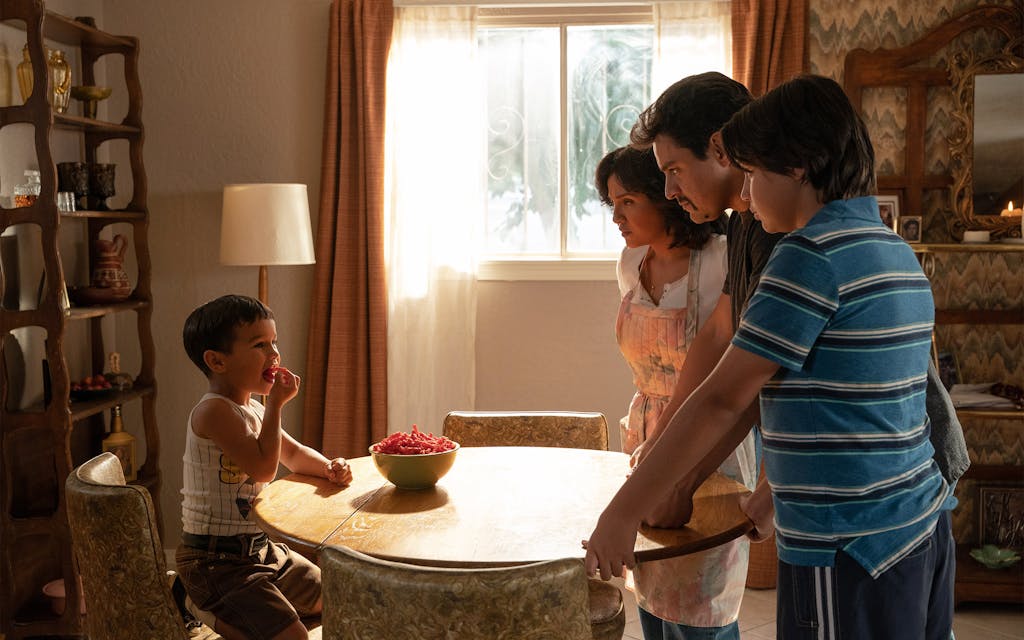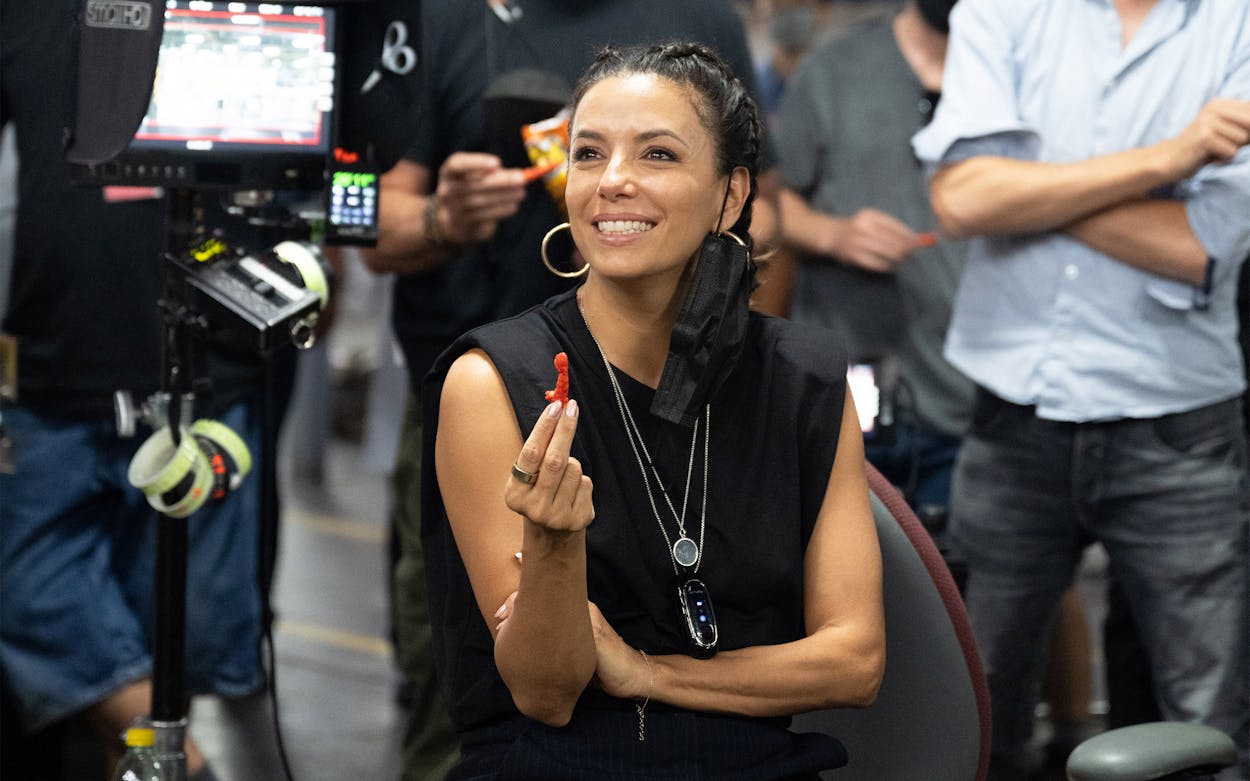Flamin’ Hot Cheetos weren’t made with me in mind. I’m a white guy who was born in Indiana, and the creators of the red-powdered snack were more focused on consumers living in major metro areas who bought snacks at convenience stores and gas stations. A lot of other things are made for me—there was probably a photo of someone who looked like me under a sign that read “our target customer” in the facility where Cool Ranch Doritos were conceived—but a bag of Flamin’ Hot Cheetos isn’t on the list.
Flamin’ Hot, Eva Longoria’s directorial debut, which premiered on Saturday at SXSW, wasn’t made with me in mind, either. The movie tells the story of Richard Montañez, a Frito-Lay janitor who invents the snack during his off-hours from cleaning the floor of a California Frito-Lay factory. He then ascends the company’s corporate ladder to become a director of marketing and pushes them to focus on marketing the product specifically to Latinos. The story is based on Montañez’s retellings as a motivational speaker and his 2021 memoir.
According to a long, detailed 2021 investigation by the Los Angeles Times that published during the film’s production, Montañez did not in fact invent the snack, though he did invent other Frito-Lay products meant specifically for Latino consumers (e.g., Flamin’ Hot Popcorn and Sabrositas), and he was instrumental in marketing the company’s products to Latinos. Montañez disputed the Times’ report but has not substantiated his claim that he is the sole inventor of Flamin’ Hot Cheetos.
Although Longoria meant Flamin’ Hot to be a biopic, its apparently very loose association with the truth doesn’t ultimately rob the film of its power. Longoria’s intention with the film is pretty clear: Flamin’ Hot is both for and about those who’ve too often been ignored, whether by Hollywood, by snack food companies, or by other American institutions. The film specifically shows Mexican American stories, though there’s plenty of room for others to see themselves in it too.

In the film’s version of the story, Richard Montañez (played by Jesse Garcia for most of the film, although young actor Carlos S. Sanchez portrays Montañez as a child) grows up with a preternatural gift for salesmanship. In one memorable scene, an elementary school bully mocks his burrito lunch, so he dares the boy to try it. When the bully realizes that the meal is delicious, Montañez starts selling burritos to his former tormentors for a quarter.
As he ages into adulthood, Montañez finds himself in trouble with the law, and employers refuse to consider him because of his ethnicity and how he dresses. He also has kids to feed, a wife who’s putting in long hours working in a department store (Annie Gonzalez, a revelation in the role), and a father who withholds his respect (San Antonio native Emilio Rivera). When Montañez eventually scores an interview at the Frito-Lay plant in Rancho Cucamonga, he successfully sells himself to the middle manager doing the hiring (Veep’s Matt Walsh, weary as ever). Once he starts the job, Montañez is the picture of ambition, badgering an avuncular machinist (Dennis Haysbert) into teaching him the ins and outs of the factory floor.
As the eighties roll into the nineties, however, Montañez finds himself stagnating as the factory faces layoffs. Determined to save his and his friends’ jobs, he hits upon his eureka moment while at a corner store where he and his fellow Latino coworkers lament that there are no Frito-Lay products that cater to their tastes. He quickly enlists his family into testing recipes until he creates a Cheeto dust that, as his youngest son puts it, “burns good.” From there, he calls up Frito-Lay CEO Roger Enrico (the eternally likable Tony Shalhoub), impresses him with his ambition, and—with the help of his buddies from the neighborhood—turns Flamin’ Hot Cheetos into the phenomenon that it is today, before earning himself the promotion from the factory floor to the corner office.
The story is, indeed, too good to be true, but it doesn’t matter. Rocky isn’t a true story, either (Chuck Wepner’s legal claims aside), but we still find inspiration in his struggle. And there’s plenty to find inspiring about Flamin’ Hot. Montañez’s character monologues to Enrico about why his spicy Cheeto is the product that’ll save the company—because, he says, when communities that have felt ignored see a product that’s made with them in mind, and are given a chance to taste something that conjures the comforts of the places they come from, they’ll line up to buy it. He might well be talking about the film itself. There’s plenty for anyone of any background to enjoy about Flamin’ Hot, but those who come from underrepresented communities such as Montañez’s (and Longoria’s) are likely to find that deeper connection.
The film is also a triumph for Longoria, a first-time filmmaker. Flamin’ Hot could have been preachy or treacly or worse—a movie about the creation of a snack product has the potential to be boring as dirt. Screenwriter Linda Yvette Chávez (who cocreated Netflix’s Gentefied) provides a breezy script that draws on unlikely sources of inspiration (it shares some noticeable structural similarities to Goodfellas!). It left plenty of room for Longoria to be inventive; at times, her visual storytelling reminded me of British filmmaker Edgar Wright, an impressive achievement. Longoria successfully maintained the story’s emotional core without ever taking the story of a spicy piece of puffed corn more seriously than she should. The moment in which Montañez and his wife await their youngest son’s verdict on whether the chip burns good or burns bad is as tense a scene as any I’ve watched at SXSW.
That speaks to the true joy of watching Flamin’ Hot. For a movie about snacks, it has a lot to say. And the main thing it has to say is that when marginalized folks get a chance to show what they can do, we get exciting new ideas—and this benefits all of us. We get opportunities for communities to see themselves represented in new ways. We discover a deft new director in a 47-year-old Latina actress from Corpus Christi. We get new visions for what success can look like. We get a more interesting, more dynamic, more colorful world. We get Flamin’ Hot Cheetos.








